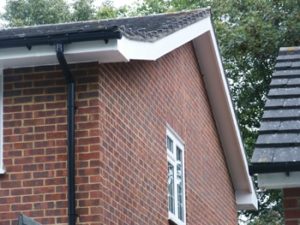How To Outsmart Your Boss In Fascia And Soffit Specialists
페이지 정보

본문
Understanding Soffit and Cladding: Importance, Types, and Installation
Soffit and cladding are 2 important components of a building's exterior that typically go unnoticed but play a vital function in both looks and functionality. While soffit describes the material that covers the underside of eaves or overhangs, cladding describes the material applied to the outside of a building to supply it with a protective layer and a visually enticing surface. This detailed short article will dive into the types, significance, advantages, installation, and often asked questions relating to soffit and cladding.

Significance of Soffit and Cladding
Both soffits and cladding serve substantial purposes for building and architectural style:
Soffit
- Ventilation: Adequate soffit ventilation enables airflow in the roofing area, which assists regulate temperature and humidity, reducing the threat of mold and rot.
- Security: Soffits protect the rafters and eaves from water damage and insect invasion.
- Aesthetic Enhancement: Well-designed soffits enhance the overall look of a building, offering a completed appearance to roofing system overhangs.
Cladding
- Insulation: Cladding assists to insulate the structure, improving energy effectiveness by maintaining interior temperature levels.
- Weather Resistance: It safeguards the structure from components such as rain, wind, and snow.
- Visual Appeal: With a range of products available, cladding allows architects to develop visually spectacular exteriors.
- Maintenance: High-quality cladding decreases the requirement for regular maintenance and repairs.
Kinds of Soffit and Cladding
Soffit Types
Soffits can can be found in various products, including:
- Vinyl: Known for its low maintenance and weather-resistant homes.
- Aluminum: Durable and resistant to deterioration but may dent much easier.
- Wood: Offers aesthetic appeal however needs routine maintenance and treatment for weather condition resistance.
- Fiber Cement: Combines toughness with the appearance of wood, resistant to rot and insects.
Cladding Types
The choice of cladding materials can considerably affect both aesthetics and performance. Common types consist of:
- Vinyl Cladding: Cost-effective, lightweight, and readily available in different styles and colors.
- Wood Cladding: Naturally lovely, however needs routine treatment and maintenance.
- Brick: Extremely long lasting and fireproof but more pricey and needs professional installation.
- Stone and Stone Veneer: Offers a traditional appearance and unrivaled durability, ideal for high end homes.
- Fiber Cement: Mimics wood or masonry with a fraction of the maintenance, resistant to weather and bugs.
- Metal Cladding: Often used in contemporary designs, supplies a commercial appeal and substantially withstands weathering.
Contrast of Soffit and Cladding Materials
The following table describes the essential features and characteristics of numerous soffit and cladding materials:
| Material | Maintenance | Resilience | Aesthetic Appeal | Cost | Insulation Property |
|---|---|---|---|---|---|
| Vinyl Soffit | Low | Medium | Great | Low | Low |
| Aluminum Soffit | Medium | High | Fair | Medium | Low |
| Wood Soffit | High | Low to Medium | Outstanding | Medium | Low |
| Fiber Cement | Low | High | Exceptional | Medium | Medium |
| Vinyl Cladding | Low | Medium | Good | Low | Medium |
| Wood Cladding | High | Medium | Excellent | Medium | Medium |
| Brick Cladding | Low | High | Exceptional | High | High |
| Stone Veneer | Medium | High | Exceptional | High | High |
| Metal Cladding | Low | High | Fair to Excellent | Medium to High | Low |
Installation of Soffit and Cladding
The installation process of soffit and cladding varies depending upon product option and local structure codes. However, understanding the basic steps included can be practical:
Steps for Installing Soffit
- Preparation: Gather all tools and products required, consisting of panels, nails, and safety equipment.
- Measurement: Measure the location properly to cut soffit panels to the right size.
- Ventilation: Ensure proper air flow by including vents where required.
- Installation: Attach the panels beginning with one side, guaranteeing they fit properly into the recognized framework.
- Completing Touches: Seal any spaces for insulation and aesthetics.
Steps for Installing Cladding
- Framework Setup: Create a robust structure using vertical battens if required.
- Insulation: If insulating, install insulation boards before cladding.
- Cutting Panels: Measure and cut cladding panels based on design requirements.
- Attachment: Secure panels utilizing suitable fasteners, ensuring positioning and level.
- Sealing: Seal joints and edges for weather resistance.
Often Asked Questions (FAQs)
1. What is the typical lifespan of cladding materials?
The life-span varies extensively among products:
- Vinyl: 20-40 years
- Wood: 10-30 years (with maintenance)
- Brick and Stone: 50+ years
- Fiber Cement: 25-40 years
2. Is soffit installation needed?
Yes, soffit installation is essential for appropriate ventilation and securing the roof structure from weather condition damage, pests, and rot.
3. Can soffit be installed without cladding?
Yes, soffit can be set up separately. However, it is typically installed in conjunction with cladding for improved aesthetics and protection.
4. What factors should be considered when picking cladding?
Essential factors include:
- Desired aesthetic
- Climate factors to consider
- Spending plan constraints
- Maintenance requirements
- Energy efficiency
5. Can I set up soffit and cladding myself?
While DIY installation is possible for those with adequate abilities, hiring experts makes sure quality workmanship and compliance with building regulations.
Soffit and cladding are vital parts of a structure's outside that significantly effect visual appeals, performance, and energy efficiency. Comprehending their types, benefits, and installation processes can aid property owners and home builders in making informed choices. Whether using vinyl, wood, or fiber cement, selecting the right products and guaranteeing correct installation will boost the longevity and charm of any structure while keeping its protective qualities.
- 이전글It's The Complete Cheat Sheet For Keyless Entry Battery Replacement 25.07.12
- 다음글Ensuring Trust in Online Betting with Sureman: Your Scam Verification Platform 25.07.12
댓글목록
등록된 댓글이 없습니다.


